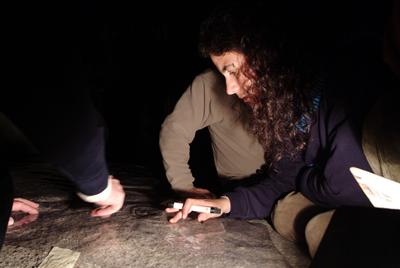Joana Valdez-Tullet
PhD student

Hi, I'm Joana Valdez-Tullet and I studied within Archaeology at the University of Southampton.
The research interests of the lecturers at Southampton were the best match to support my project and the department has a strong focus on computer base research that would allow me to develop some specific aspects of my research.
My name is Joana and I am originally from Aveiro, Portugal.
What was your first degree in? Where did you study it?
I did my undergraduate degree at the University of Minho (Braga, Portugal), followed by a Diploma in GIS at the University of Porto (Portugal), where I also completed my MA.
What made you decide to study archaeology at postgraduate level?
Ever since I was a child I wanted to be an archaeologist. After completing my first degree I worked in commercial archaeology for almost ten years, and although I was still doing research, I felt like it was time to move on to new challenges. I always had an interest in research and wanted to do a PhD, following some topics that I started developing in my BA.
Why did you choose to study at Southampton?
The research interests of the lecturers at Southampton were the best match to support my project and the department has a strong focus on computer base research that would allow me to develop some specific aspects of my research.
Tell us more about the areas of archaeology that you are now specialising in.
I am currently studying a specific type of rock art - Atlantic Rock Art - that can be found in several modern European countries.
My research is a landscape scale study of of this type of prehistoric rock art, using GIS to analyse its spatial characteristics with regard to its social and cultural context. I will also be drawing upon a repertoire of recording techniques, including RTI and Photogrammetry.
Are you enjoying your studies? What do you like most about your degree programme?
I am enjoying my degree very much. It is great to be part of such a wonderful research community where people are so friendly and supportive.
The university provides plenty of support through a range of courses to develop our research skills, from more abstract themes such as "Critical Thinking" to more practical and technical aspects such as "Endnote" to support the construction of a PhD thesis.
Academic advice is provided through a supervisory team giving us access to a variety of experience and technical and theoretical knowledge.
Do you get on well with the academic staff?
Yes, in general staff is very friendly and accessible. Even if they are not part of the supervisory team, they always seem to have time for a chat.
What's the best thing about living and studying in Southampton?
Southampton is a vibrant multi-cultural city, close to a variety of exciting archaeology and areas of outstanding natural beauty. The university has a good reputation and a wide range of expertise, allowing its students to thrive.
What are you planning to do after graduating?
After graduating I am looking forward to continuing an academic career or any other job related to research and my fields of specialisation.
Do you have any advice for people considering studying archaeology at postgraduate level at Southampton?
Southampton is a very good place to enrol as a postgraduate level regarding staff and archaeology community in general. If you can find a match for your research subjects here, then go for it!!